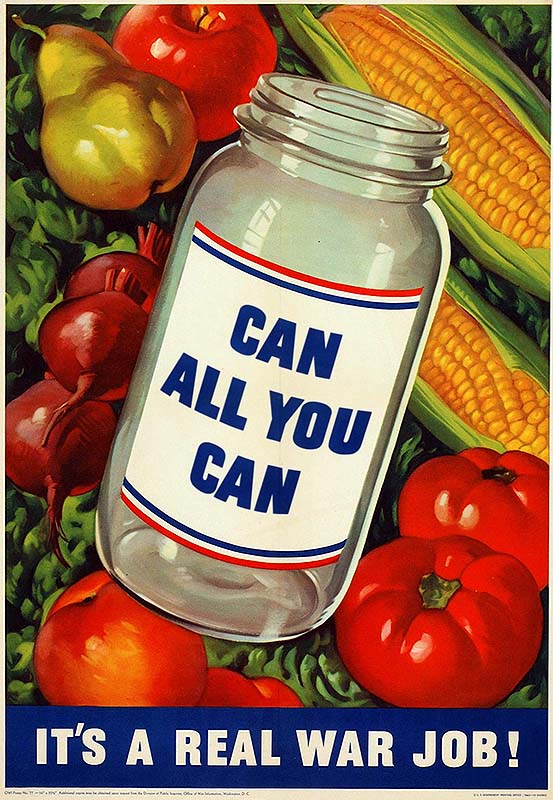In recent years our country has struggled with so many different issues concerning our food system. It has come so far as gardeners and small farmers being idealized as a group of activists by many Americans. How does growing your own food warrant such a label?
It is almost as though the activist label has derived out of a huge GLOBAL question on “How to feed the World?” Should that question be as large as the entire planet or should it be tamed to a much smaller question as simple as “How to feed Yourself?”
Perhaps we’ve come so far as a society in our country that we’ve forgotten our heritage as farmers who grew their own food. This was a time when families and communities worked together canning and preserving food to put up in the pantry and cellars. Could this indeed be the answer to the question of what sustainability means?
Are today’s modern Americans trying to over-define and philosophy words to the point of utter confusion? I’ve noticed recently that several major reporters and writers now want to define the words Organic versus Local and debating over which is more sustainable. Does finding the pros and cons of each system change the simplicity that holds true by growing our own food?
Perhaps sustainability comes when American families and communities begin working together once more. Inner cities, urbanites and rural citizens alike might slow down the race to profits and conveniences.
Instead of the hunt for prepared and processed supermarket food, families might find the grassroots of our country. The pride America has had historically by the food they’ve grown themselves and sharing with their neighbors and community had made us a strong and healthy nation.
Because of the demand by Americans for healthy non-GMO and organic food, I would have to agree that organic is a healthier alternative. But when supply cannot meet demand and our markets become flooded with imported organic food, do we find that option more sustainable? And should the organic farms that are growing and producing in our country also be turned into giant mega-farms where integrity becomes in jeopardy? These are a very important question we must all ask ourselves.
Obviously buying food produced locally would curb a tremendous burden on our natural resources worldwide. But as many Americans have found, locally produced foods are hard to come by. Our small family farms are few and have been replaced by big corporate agribusiness.
The entire chain of events that once made up our communities to mill and process their own foods have disappeared. Our locally owned business and retails have been taken over by corporations and big box stores that frankly don’t carry much of anything produced locally. Mom and Pop are far and few between and frankly American Made pretty much doesn’t exist these days.
So America, you tell me if growing our own food can make a difference. Can it all be as simple as that? We are stewards of this land in which we were blessed with. Without it we simply can not exist. Are we too spoiled for Victory Gardening?
- Wild Dagga Motherwort Medicinal Herb - November 11, 2013
- Grow The Best Organic Lettuce - November 4, 2013
- Amish Hot Pepper Mustard - October 23, 2013



I think there is a surge among numerous college kids to eat local, healthy and creatively. Our society as a whole, I believe, has ‘forgotten’ the rudimentary teachings of a few generations. There is a high level of our population who is too used to the fast food mentality and needs help breaking out of ill gotten habits.
For example, I remember in High School (during the 70’s) we had Home Ec and classes were taught not only on how to cook but how to use local fresh ingredients, how to sew, our teacher even taught homemade ‘cleaners’ as an alternative to always picking up a can of spray – Perhaps canning 101 should become a free extension course not only for adults – but back in schools (both HS and College level)
Learning to can is an overwhelming thought for some folks, how to begin, how to season, can I afford the materials (truly for those in underserved area’s and the poor – how do you afford to buy all the necessary tools??) Freezing is a great alternative for cost effectiveness but again – the room necessary to stock up for a winter is quickly overrun by I can’t fit anymore in 🙂
Would love to see an article on creative canning, simple methods with a few straightforward recipes (like your awesome greenbeans and lovely salsa!!)
As always love to read what you have to say Pam!!
Some very good points artful gardens! And we shall work on some new helpful articles. Thank You so much for your support!! 😉
To learn the rhythms of the seasons is to know yourself; and many of us pitter out with the realization of how truly lazy, impatient and unfocused we have become due to conveniences. For the first time in my life, I know what it is to be “grounded.” This groundedness comes by learning slowly, starting small and continually checking my goals. How many times have I met a new gardener who is more determined to quit than to downscale plans that were to too big, too fast? Raised beds, soil, seeds, plants. . .all so easy to install during the coolness of spring, suddenly become drugery under the blistering sun during long spells of hose holding, weed pulling, tending and harvest. To “see” the canned product in your mind at the beginning of the season is more important than picking the perfect organic seed. A perfect seed remains just that without the hard, long, dirty work. . .and it is so much easier to “talk” about the global problem than it is to do anything in one’s own backyard. Thanks for this article!
So Beautifully said Grami and words to live by as well. What you say should be an inspiration to many new gardeners. Thank You for this comment! 😉
Enjoyed reading this and now have motivation to get up off my duff and go plant! Thank you!
Grow it Dot!!! Keep us posted!!! =D
Awesomely stated. I find that growing my own, canning my own, and keeping it viciously local ( the front yard) makes me both empowered and rebellious at the same time.
If only we could change the way America thinks, and remind people that they are too good for processed, commercial food, I think we could change our great country. That is my mission, every day, with every patient and ever client I have.
That is the perfect attitude Gia Cass! We are way to good for processed and commercial food!! I feel very Thankful for people like you that make it their mission to share this information with others!! Let us keep on growing! 😉
activists – humm – Gardening activists. Let’s see; for-a-cause activist lots of marching – on government buildings, senate & congressional offices, court houses, etc. Gardening activist – lots of strolling through the garden, tending to gardening activities: but no marching. for-a-cause activist lots of protesting: gardening “activists” searching for ways to circumvent gmo and other government approved additives to our food source: but no protesting. Gardening Activists – playing in the dirt: for-a-cause activist – dishing the dirt. For-a-cause activist playing real-life manopoly trying to gather as much space and things as possible: gardening activist – borrowing the soil to produce food, herbs, and flowers but returning the soil to its original state or in a better state. Yup, maybe I’m a gardening activist
We should all indeed be proud of being a Gardening Activist Lady Bug Gardener! You make me smile!! 🙂
Wonderful article! I’ve been gardening for a few years now, and while it’s difficult growing enough to eat in the Las Vegas desert, it is so rewarding and fulfilling to me. I can’t imagine not having that connection to the earth.
It is very rewarding and the connection is truly amazing Regan…I think it is getting harder for many gardeners to grow enough these days. I know here between the bad droughts we have experienced and now across the midwest having droughts this year. I can almost understand where you are coming from. But grow we much =D